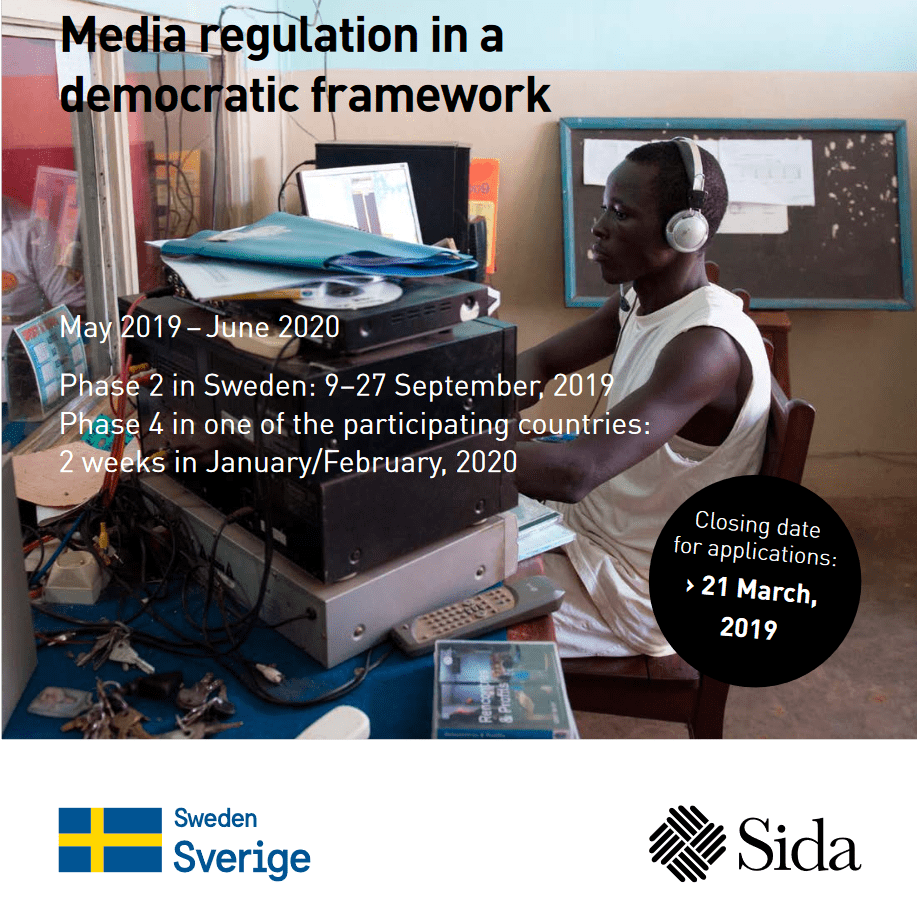Application Deadline: March 21st 2019
The Swedish International Development Cooperation Agency (Sida) has commissioned NIRAS Sweden AB to organise this ITP in cooperation with International Media Support (IMS), Fojo Media Institute/Linnaeus University and Global Reporting Sweden AB.
Participants can be nominated by government, media and civil society organisations. Reaching out to a critical mass of stakeholders in each country will be particularly important for institutional change and thus long-term impact.
Five programmes have been initiated so far, with one launched in Kenya, Tanzania, Uganda, Zambia and Zimbabwe in 2018 and one starting from 2019; two in Latin America (Colombia, Honduras, El Salvador and Guatemala) starting from 2019; and one in Asia (Bangladesh, Cambodia, Laos, Vietnam and Myanmar) starting in 2019.
Programme Objectives
The overall objective of this programme is that the participants and their organisations should contribute to the promotion and protection of the institutional frameworks which govern self-regulation of the media sector.
This can include:
• The participants and their managers understand the benefits of self-regulation.• Participants are using their achieved knowledge in their respective transformation project.
• Participants and their organisations are included in regional dialog platforms on issues related to regulation of the media in a democratic framework.
TRANSFORMATION PROJECT
This programme is more than training of individuals. It is a full-scale capacity building programme aiming at actual change towards a more efficient and sustainable planning and imple-mentation of self-regulation of the media.
At the start of the programme each participant will, in close cooperation with colleagues and supervisors, identify an idea that can contribute to the achievement of both the programme objective and the organisation’s own strategies and long-term goals, as well as transformation process on a national level.
Based on this idea, a Transformation Project will evolve as the participants are provided with new knowledge, networks and experiences during the course of the process.
The participants work together in country-teams, supported by a national facilitator in each country, assisted by international experts (thematic mentors). This support will be continuous throughout the five phases of the programme.
BENEFITS FOR THE PARTICIPANTS AND THEIR ORGANISATIONS:
At the end of the training programme the participating individ-uals and organisations shall have obtained:
• Increased knowledge about media and freedom of expression in relation to media policy, journalism and self-regulation of the media sector.
• Extended professional national and international networks.
• Increased awareness of human rights, gender equality and security for journalists and other media actors.
• Increased knowledge and capacity to initiate a structured, long term transformation work within and outside the re-spective organisations.
Timetable
This programme is implemented during a 14 month period and consists of five phases linked to the development of the participants’ Transformation Projects.
Phase 1 Inception, May – August, 2019
Phase 2 Course in Sweden, 9 – 27 September, 2019
Phase 3 Project Development, October 2019 – January 2020
Phase 4 Regional phase, 2 weeks in January/February 2020
Phase 5 Implementation, March – June, 2020
The following programme will formally start (with a start-up seminar) when the participants in this programme have their final seminar.
COSTS
Sida will cover the costs for programme fee, literature, accom-modation, meals, health insurance, and international travel to the scheduled courses.Participants and/or their employers are responsible for any other costs such as:
• personal expenses
• visa fees
• domestic travel – in connection to international travel and to meetings in phases 1, 3 and 5
• any local airport taxes and departure fees or such
• any costs for programme work taking place at the home organisation
INVITED COUNTRIES
Invited countries are: Kenya, Tanzania, Uganda, Zambia and Zimbabwe.
TARGET GROUP
The programme targets individuals that in different ways can promote standards and self-regulation of the media sector in the respective countries.
The programme management will identify strategically important participants from the media sector, such as media councils, judicial institutions, independent freedom of speech organisations, policy institutions, relevant ministries, parliamentary committees and independent media outlets.
Despite the focus on individuals, the programme is primarily targeting organisations and efforts will be made to establish long-term relationships with the key organisations involved.
Such collaborative organisations should be willing to commit themselves to participation over several years and be ready to cooperate with other organisations in the programme, even though they may have different opinions on regulatory frameworks. Capacity and interest to drive processes to achieve long-term goals is a prerequisite to become a collaborative organisation.
Applicants to the programme should:
• hold a key position in their organisation, with influence on a strategic level
• have the engagement and power to initiate and drive change processes
• have high proficiency in English
• hold a relevant academic degree
• be available and motivated for active participation through the whole training programme.
SELECTION
All applicants will be notified of the results of the selection no later than May 2019.
A
Memorandum of Understanding will be signed by the management of each
participating organisation and by the programme management. This is to
confirm each party’s responsibility and the organisation’s commitment to
partici-pation and fulfilment of all phases of the training programme.
It is only with this MoU signed by both parties, that the participation is accepted.
APPLICATION•
The application should be written on the special form attached and include a recent photo.
• Make sure your application is complete, correct and readable.
• A candidate has to be nominated by his/her organisation and the application must be signed by an authorized director/manager.
• A scanned copy of the application should be submitted by e-mail to [email protected]
• If a scanned copy is not possible, the original application shall be submitted to the nearest Swedish embassy/consulate.
For More Information:

